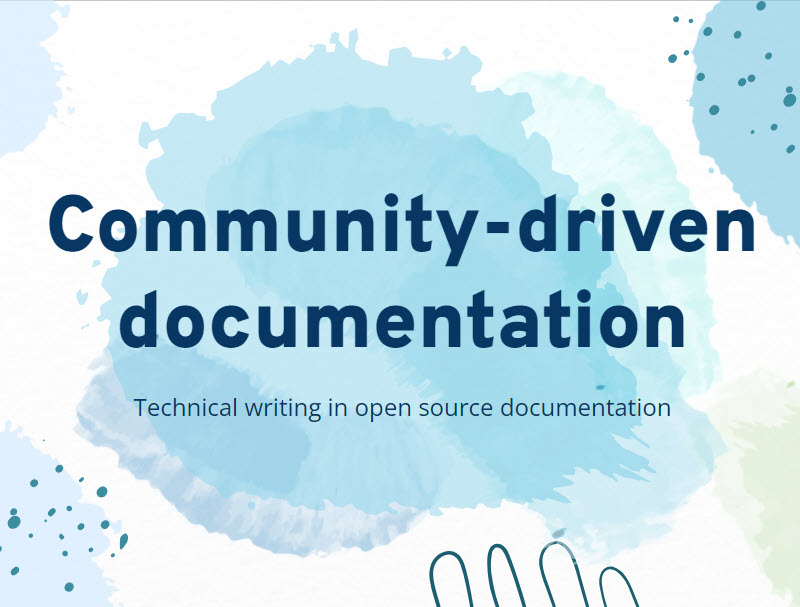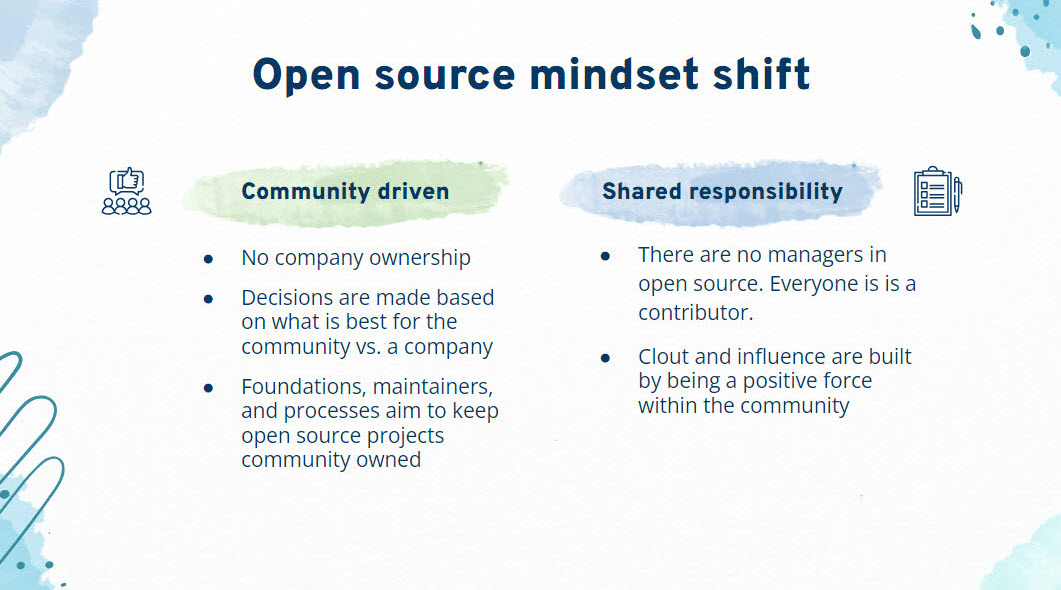The open source mindset shift

Photo of slide presented by my coworker, Abigail McCarthy
Yesterday I gave a presentation with my fellow co-worker Abigail McCarthy, who is another open source technical writer at VMware. She and I frequently give presentations together. You can see the full slide deck here: Community-driven documentation: Technical writing in open source documentation.
I really loved one slide in particular that Abigail shared and it inspired me to write the following post in The Good Docs Project Slack workspace:
Hello! In case you don’t know me yet, I’m Alyssa, one of your friend community managers. I wanted to drop a note in here today because we’ve been getting a lot of new community members (which is awesome!) who are maybe having their very first experience with working at an open source project (which is actually SUPER awesome!).
I’d like to share some tips and tricks about the “mindset shift” that sometimes comes from working in open source to help our new community members get used to open source culture.
There are some pretty big cultural differences and, if the only experience a new community member has is working as an employee at a company, it can sometimes take some time to get used to those differences. Interestingly enough, I actually did a co-presentation this morning at my company with Abigail McCarthy, another open source technical writer at my company. We talked about some of those differences. I wanted to share a few ideas with you both from that presentation and from my observations I’ve been having with various Good Docs Project community members this week:
Open source projects tend to be “do-ocracies” and operate on a democratic governance model where no one is fully in charge the way the C-suite or your manager is in charge at work. Although we have working group leads + we have some members of the project who have been here a long time and have built up social capital, we’re just contributors like you at the end of the day. We make decisions as a community and we invite anyone to step up and lead if they are passionate and willing to do the work.
So, if you feel like the community should decide to do something or take some kind of action, the best way to do that is to open things up to the community for discussion or—even better—roll up your sleeves and do some of the initial groundwork yourself. 😄
Everyone here is a volunteer who tries their best to put the project and the community’s interests ahead of their own personal, professional pursuits. We want to build a “sticky” community, meaning people want to “stick around” for the long term because it has some deeper value to them. That means we are trying to work for a meaningful cause that we all care about, such as improving documentation in open source or in the tech industry in general. And, yes, it also means we try to support each other in improving our professional skills and growing our professional network.
In our presentation today, my fellow co-presenter cited a CNCF survey in which 79% of respondents said that contributing to open source had helped their career in some way. I LOVE that!
But at the same time, I want to caution that improving your skills and career prospects should be seen as a positive side benefit of contributing to open source and not the primary purpose. We hope that all of you want to contribute to our project because you care about what we’re trying to do on some level and that you develop professional friendships here that add value and meaning to your life. Remember to try to put the project’s needs and the community’s best interests first. ❤️
Be mindful of the work you leave for others. It takes a lot of work from our supporting teams and from working group leads to make sure everyone has a positive experience in this community. It’s tough, often invisible work making sure all our infrastructure is working properly, that our contributing processes are in a healthy state, and that everyone has a meaningful task to work on with adequate community support. Be mindful of the demands you make and the work you create for the members of our community who serve in these roles. A phrase I really like to ask myself is: “If not me, then who?” :person_raising_hand:
Thanks again to all of you for your hard work and friendship! We’ve built a great community here. And here’s a screenshot that my co-presenter Abigail McCarthy shared today that sums this all up for me. I loved this slide of hers!
